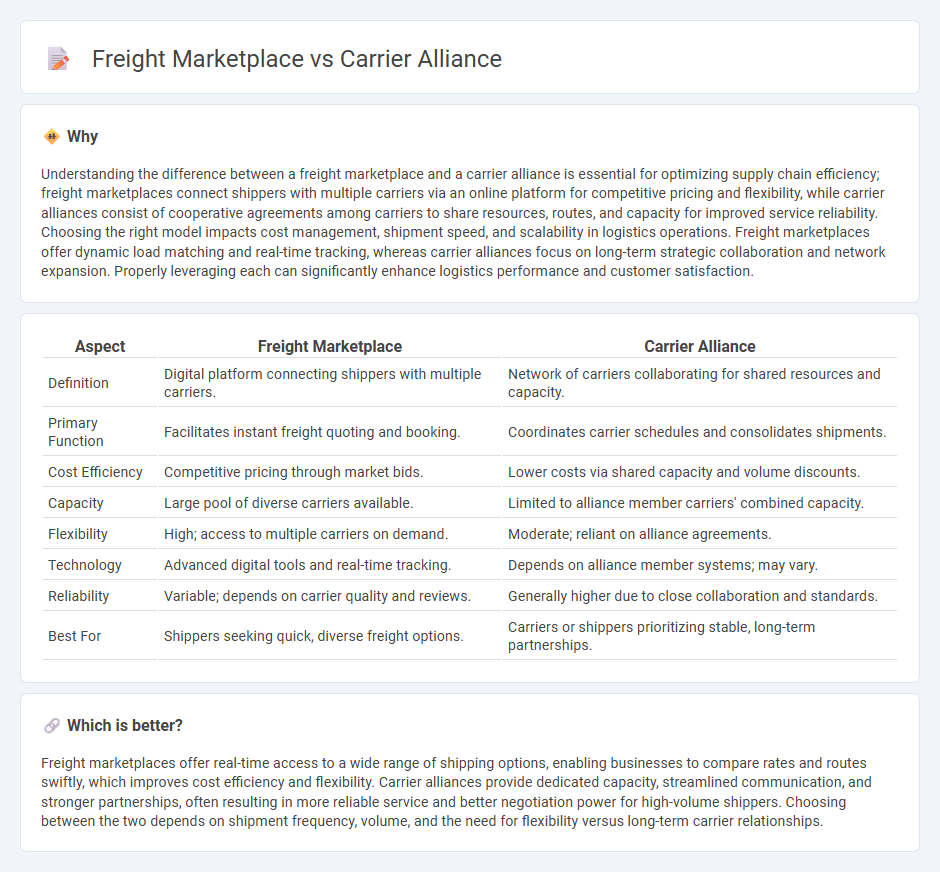
Freight marketplaces connect shippers directly with multiple carriers, offering competitive pricing and real-time load availability to optimize transportation efficiency. Carrier alliances pool resources from various carriers to enhance capacity, expand service networks, and improve operational reliability through collaborative agreements. Discover how choosing between a freight marketplace and a carrier alliance can transform your supply chain strategy.
Why it is important
Understanding the difference between a freight marketplace and a carrier alliance is essential for optimizing supply chain efficiency; freight marketplaces connect shippers with multiple carriers via an online platform for competitive pricing and flexibility, while carrier alliances consist of cooperative agreements among carriers to share resources, routes, and capacity for improved service reliability. Choosing the right model impacts cost management, shipment speed, and scalability in logistics operations. Freight marketplaces offer dynamic load matching and real-time tracking, whereas carrier alliances focus on long-term strategic collaboration and network expansion. Properly leveraging each can significantly enhance logistics performance and customer satisfaction.
Comparison Table
| Aspect | Freight Marketplace | Carrier Alliance |
|---|---|---|
| Definition | Digital platform connecting shippers with multiple carriers. | Network of carriers collaborating for shared resources and capacity. |
| Primary Function | Facilitates instant freight quoting and booking. | Coordinates carrier schedules and consolidates shipments. |
| Cost Efficiency | Competitive pricing through market bids. | Lower costs via shared capacity and volume discounts. |
| Capacity | Large pool of diverse carriers available. | Limited to alliance member carriers' combined capacity. |
| Flexibility | High; access to multiple carriers on demand. | Moderate; reliant on alliance agreements. |
| Technology | Advanced digital tools and real-time tracking. | Depends on alliance member systems; may vary. |
| Reliability | Variable; depends on carrier quality and reviews. | Generally higher due to close collaboration and standards. |
| Best For | Shippers seeking quick, diverse freight options. | Carriers or shippers prioritizing stable, long-term partnerships. |
Which is better?
Freight marketplaces offer real-time access to a wide range of shipping options, enabling businesses to compare rates and routes swiftly, which improves cost efficiency and flexibility. Carrier alliances provide dedicated capacity, streamlined communication, and stronger partnerships, often resulting in more reliable service and better negotiation power for high-volume shippers. Choosing between the two depends on shipment frequency, volume, and the need for flexibility versus long-term carrier relationships.
Connection
Freight marketplaces streamline cargo booking by connecting shippers with a wide network of carriers, enhancing capacity utilization and reducing empty miles. Carrier alliances unify multiple trucking companies under collaborative agreements, enabling shared resources and expanded service coverage. The integration of freight marketplaces with carrier alliances boosts logistics efficiency by facilitating real-time load matching and optimized route planning across pooled carrier networks.
Key Terms
Capacity Sharing
Carrier alliances enhance capacity sharing by pooling resources from multiple carriers, enabling optimized route planning and improved load utilization. Freight marketplaces facilitate real-time matching between shippers and carriers, offering dynamic access to available capacity but with less control over fleet coordination. Explore how these models impact capacity efficiency and operational agility in logistics.
Rate Negotiation
Carrier alliances leverage collective bargaining power to secure more favorable rates by pooling shipments and increasing volume commitments, resulting in reduced costs and improved contract terms. Freight marketplaces offer a dynamic platform where shippers can compare multiple carrier bids in real-time, fostering competitive pricing but often lacking the stability of long-term negotiated agreements. Explore how each approach optimizes rate negotiation to enhance your shipping strategy.
Digital Platform
Carrier alliances leverage integrated digital platforms to streamline logistics by pooling resources, optimizing load matching, and enhancing route efficiency across multiple carriers. Freight marketplaces utilize digital platforms to connect shippers directly with a broad network of carriers, offering real-time pricing, availability, and instant booking capabilities. Explore how advanced digital platforms transform logistics operations by visiting our in-depth guide.
Source and External Links
How 2025 Carrier Alliances Will Transform Freight Forwarding - Carrier alliances like Ocean Alliance, Premier Alliance, and Gemini Cooperation in 2025 bring new route optimization, cost savings, and reliability improvements for freight forwarding, with partnerships including CMA CGM, COSCO, OOCL, Evergreen, HMM, ONE, Yang Ming, Maersk, and Hapag Lloyd.
Carrier Alliance Line Up For 2025 - Atlantic Pacific Global Logistics - Key carrier alliances in 2025 include Gemini Cooperation (Maersk, Hapag Lloyd), Ocean Alliance (CMA CGM, OOCL, Cosco, Evergreen), THE Alliance (ONE, Yang Ming, HMM), with MSC operating independently after splitting from the 2M alliance.
What shippers should know about ocean carrier alliance changes in 2025 - The 2025 ocean carrier alliances Gemini, ONE, and Premier control 80% of global container capacity, with Gemini (Maersk and Hapag Lloyd) aiming for higher schedule reliability and a hub-and-spoke network to improve efficiency amid competitive shipping markets.
 dowidth.com
dowidth.com